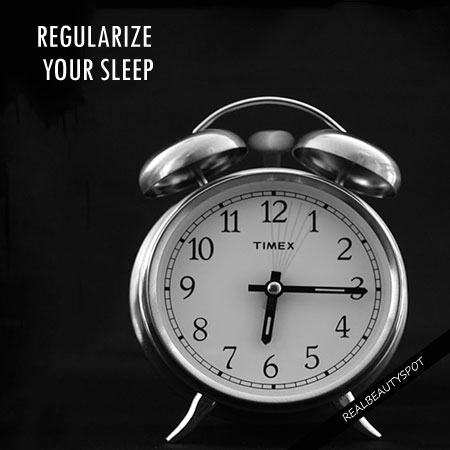Do you often wake up at night and keep staring at the fan or ceiling?
You are not alone. Insomnia is incredibly common these days thanks to the changing lifestyles and stress.
So for all those seasoned insomniacs out there and for anyone who occasionally can’t fall or stay asleep, I have rounded up some short- and long- term strategies for getting a good night’s rest.
- Just 10 to 20 minutes of napping during the day can help us feel rested (and improve our creativity and memory, to boot!). But try to avoid napping after 3:00 or 4:00pm, as this can make it harder to fall asleep at bedtime.
- Eat foods high in magnesium, like halibut, almonds, cashews, and spinach, and foods high in vitamin B complex, like leafy green vegetables, nuts, and legumes. Some experts also recommend taking supplements of taurine, vitamin B6, and magnesium.
- Increasing natural light exposure during the day promotes healthy melatonin balance, which can help us get to sleep later in the day.
- It’s tempting to reach for coffee when we’re tired after a poor night’s sleep, but drinking caffeine can make it harder for us to fall asleep at night, creating a vicious cycle.
- Studies find moderate aerobic activity can improve insomniacs’ sleep quality. For best results, exercise at least three hours before bedtime so the body has sufficient time to wind down before hitting the bed.
- Need another reason to quit smoking? Smokers commonly exhibit symptoms of insomnia—possibly because their bodies go into nicotine withdrawal during the night.
- Uncomfortable bedding has been linked to poorer sleep quality, while a comfortable mattress can up the chances of a satisfying snooze.
- Find activities that help you wind down before bed, and stick to the same sleep-wake schedule, even on weekends.
- Record how much and when you sleep, fatigue levels throughout the day, and any other symptoms. This serves two purposes: It can identify activities that help or hurt the chances of a good night’s rest, and it’s a useful tool for a doctor or therapist, should you decide to see one.
- Digital programs like Zeo, YawnLog, and a variety of apps can all make snooze-tracking easier.
- In one study, people who practiced meditation saw improvements in total sleep time and sleep quality. Other relaxation strategies like yoga, deep breathing, and progressive relaxation are also effective tools for promoting good sleep.
- Booze might seem like an obvious choice for calming down pre-bedtime, but it can actually disrupt sleep cycles later in the night. You don’t have to give up the good stuff completely; just drink it with dinner (around 6 o’clock) and skip the nightcap.
- Don’t work, watch stimulating TV shows, read complex material, or think too hard about anything before bedtime; working out the brain keeps the body awake.
- It sucks when it’s 2 a.m. and you still don’t feel tired, despite knowing you need rest. But climbing into bed when you don’t feel ready for sleep is setting yourself up for failure. Instead, engage in relaxing activities (like gentle yoga and meditation or listening to soothing music) until you get the strong urge to snooze.
- Stepping from warm water into that pre-cooled bedroom will cause body temperatures to drop slightly, which can trigger sleepy feelings by slowing down metabolic activity.
If you’ve tried everything and nothing’s worked, it might be time to consult a professional. A doctor can help rule out any sleep disorders and identify lifestyle factors or medications that might be getting in the way of a good night’s rest.
